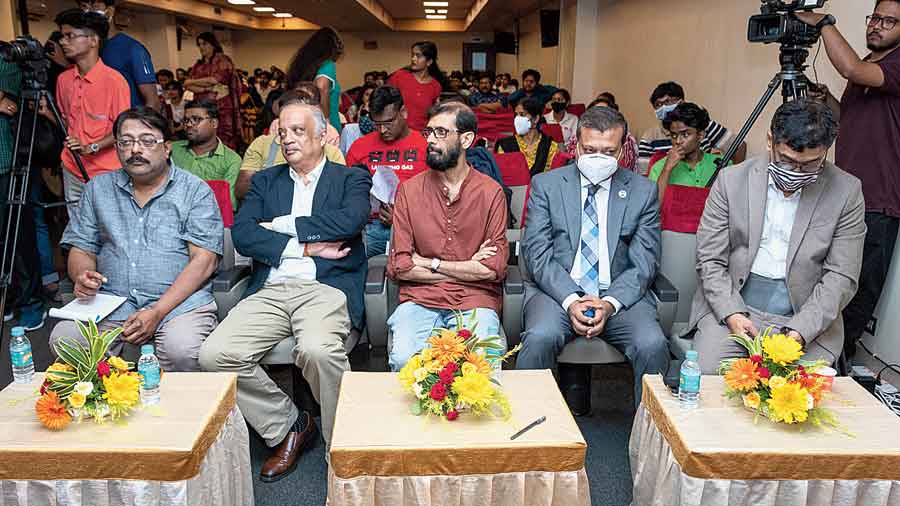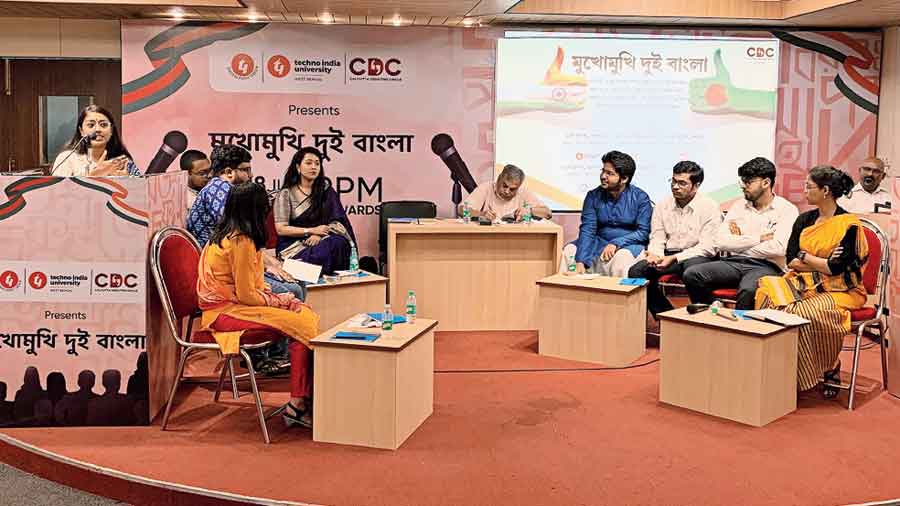‘‘Obhyorthonakari ke bolun tattobodhayak moshai kothay achhen.” If you stumbled just reading that line, imagine how confused the cosmopolitan employees of a Sector V office would be if you told them this!
“The sentence simply asks a receptionist to find the supervisor but this example goes to prove how inefficient the Bengali language is when it comes to official matters,” said Srijit Talukdar, a speaker at a recent debate at Techno India University (TIU). The topic was “Bangla bhaber bhasha, kaajer bhasha noy” (Bengali is a language of emotions, not work). It was organised by the university in association with the Calcutta Debating Circle (CDC) and was conducted in the vernacular.
“In no way is Bengali a dying or an obsolete language but in today's rat race, it doesn’t work on the official level,” argued Srijit Talukdar, a student of St Xavier’s University, New Town. “You can speak to your colleague in Bengali but when you email him it is in English. What else would it be in an office where your colleagues would be from different states of India? A Third World country like ours cannot wield the kind of power a Russia, France or Germany can in staying adamant about using their own language over a universally spoken one like English.”
The debate also had speakers from Dhaka University. One of them, Miftahl Islam Panth, said that students would never receive a complete education if they were not open to learning other tongues. “Same for trade and international relations. You can’t ask developed nations to learn Bengali and then come to buy goods from us,” he reasoned.
Students also spoke of how Amartya Sen had to write in English for global recognition and how Rabindranath Tagore’s Gitanjali won the Nobel only after it was translated to Song Offerings.

(From left) Guests Ashoke Viswanathan, Kunal Sarkar, Chandril Bhattacharya and Andalib Elias seated in the audience
Bengali at work
Those speaking against the motion put up a fight too.
Najib Haider, of Dhaka University, had come draped in a dhoti and challenged the notion that people “working” only did so in shirts and trousers. “What about those wearing dhotis and lungis who toil in farms? They contribute to the economy despite what they wear or speak — Bengali,” he said. “Countries like China, Russia and Germany are great today as they take pride in their language and use it as their medium of communication.”
Tamojit Misra spoke of how Satyajit Ray won an Oscar by working in Bengali cinema, how Vidyasagar, Tagore and Nazrul Islam worked on Bengali language and literature and how the tongue was an official language of not just Indian states but also the African country Sierra Leone. “So many schools use Bengali as their medium. Can you discount their work?” demanded the TIU student.
Shourjyo Sen said Bengali had practical uses. “Is work limited to what happens in the office? Isn't performing daily tasks also work? Well, if you go to the para tea shop you won't get served unless you speak in Bengali,” said the TIU student. “Bengali-speaking states have barely seen 100 years of independence. The language needs more time to assert itself on the international stage.”
The majority of India's population is rural, and many of them are illiterate. “Bank work, government work — everything for this population needs to be done in Bengali,” said Surosree Paul of the host college. “And who says higher education cannot be conducted in Bengali? Acharya Jagadish Chandra Bose had written science books in the language. Expressing emotions is also a job and it is what sells so many books in Bengali,” she said. “Bengali is the foundation that an entire nation was built upon. It is the identity of the Bangladeshi people and the language of business there.”
While there wasn't any formal judgment, the opposition seemed to have won the debate by a whisker, if the show of hands from the audience at the end was any indication. The debate was moderated by trustee of CDC, Pradeep Guptoo.
Among invitees to the debate were deputy high commissioner of Bangladesh Andalib Elias, cardiothoracic surgeon and trustee, CDC, Kunal Sarkar, writer-lyricist Chandril Bhattacharya and filmmaker Ashoke Viswanathan.
Manoshi Roy Chowdhury, co-chairperson, Techno India Group, said they encouraged debates as they present an opportunity of learning and expressing one’s view. “Debate and divergence of views can enrich our knowledge and empower us with critical thinking,” she said. “To be a successful speaker, one must remain empathetic as it allows one to understand the points of view of those who do not agree with them.”
